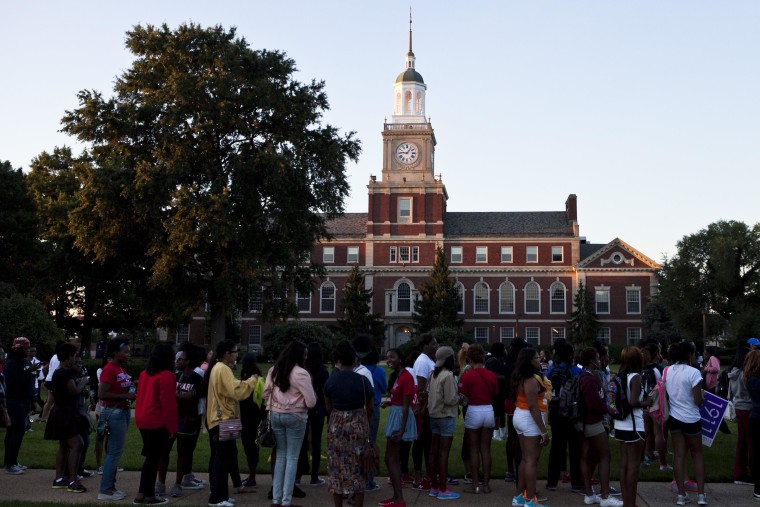Howard University recently announced that it will freeze tuition for students and offer them money back for graduating in four years or less, beginning next fall.
The decision is a bold one for the university’s new president, Dr. Wayne A. I. Frederick, given that historically black colleges and universities (HBCUs) have made headlines for their recent financial woes.
“Part of the decision-making behind this goes into the university overall diversifying revenue streams,” said Derek Kindle from Howard University financial services.
According to Kindle, the university can afford to experiment with a tuition freeze because as a research institution funds are not especially dependent on tuition, but on other sources such as research grants.
Transfer student Ayana Evans said that she often meets students at the university who have been at Howard for five or six years because they have had to take time off for financial reasons, something she understands after having her tuition go up last semester.
“The slight increase from when I started until now really made a difference last semester because it bumped up the balance a couple thousand dollars. I can now be comfortable knowing that I won’t have to worry if there will be a couple thousand dollars added to my bill next year and that’s reassuring,” she said.
“I think what the president is trying to do is ease people into the idea of college being less of a burden for students.”
By eliminating tuition as a barrier for access, entry, and retention, the university aims to show its commitment to addressing the academic needs of the African American community. According to Professor Marybeth Gasman, director of the Penn Center for Minority-Serving Institutions at University of Pennsylvania, this mission is particularly important for HBCUs.
“It’s important that everyone realize that for many HBCUs, not all, but many, you are dealing with a good number of students who qualify for pell grants—meaning they are the poorest students in the nation.
While a tuition freeze and rebate incentive can help Howard reach students with underprivileged backgrounds, there will still be challenges, Professor Gasman said.
“Howard will need to make sure it’s enrolling first generation students who understand how college works and understand that they need to provide the tools for those students to be successful too, so that it is not just second and third generation students who meet the university’s graduation goals,” she said.
Kindle acknowledged this challenge explaining that the university has had to update the way it thinks about class credits and what support systems need to be implemented on the undergraduate level to make sure that all students succeed.
Sophomore, Blake Newby, said that she thinks the new initiative will “put a fire under the belt” of faculty and staff at the university to help students get the support they need to gradate on time. She also said she is grateful for the security the decision provides her.
“It’s nice knowing I won’t have to worry about my tuition going up here at all during my time at Howard,” she said.
The freeze and rebate have also inspired Newby, who worries about her parents paying out of pocket for both her and her brother’s college education, to accelerate her academic timeline.
“Before, I had never had a thought of graduating early, it had been as long as I’m out by spring 2017, but now this is giving me more of a push to gradate a little early and take the burden off of my parents,“ she said.
Newby imagines that if she qualifies for the graduation rebate, her parents would re-invest the money into her brother’s final years of college at Howard. In this way, the tuition freeze is appealing not only to students but parents.
The university’s decision does not only affect undergraduates, but students looking into graduate school at the university as well.
Junior, Lindsay Foster, said that she will now look at Howard more closely when she is deciding on graduate programs.
“I do want to go to graduate school and I think one of the things that comes into play when thinking about that is the money,” she said. “Money is a constant issue, and if we as students are faced with the option of not having an increase in tuition that definitely comes into play and is a factor in deciding where to go.”
Foster said she found the decision refreshing and a true testament to the university listening to the needs of its students.
George Cooper, Executive Director of the White House Initiative on HBCUs, said that he has not heard of another HBCU deciding to freeze tuition and implement a money back rebate for those who graduate within four years.
“I think this will encourage institutions to see another model, whether or not it fits in the context of their policy and what they owe, I’m not sure, but I think if you’re successful other people want to be successful like you,” he said.
Cooper added that Howard’s decision is in line with the administration’s goal to provide a college level education to people no matter their financial background.
“I think if this works you may find that President Frederick is managing a business enterprise that is sustainable for years to come,” Cooper said. “He will have his phone ringing off the hook to determine how this works and whether or not it’s appropriate for other schools.”
Evans said that the announcement of a tuition freeze changed her opinion of the university’s president.
“At first I didn’t think there was much transparency in the way that he worked,” she said. “But when I read about this freeze I understood he is very dedicated to education, it made me very reassured that he is a good leader of this institution.”
